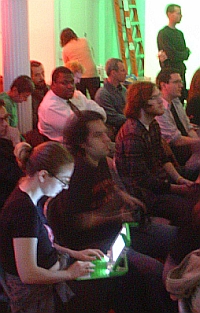Originally posted on sciy.org by Ron Anastasia on Thu 14 Jun 2007 01:00 AM PDT

Building One Laptop Per Socialized Child
Posted on June 12, 2007 by Eduardo Villanueva Mansilla in Commentary: Academia, Use Cases: Community
Social inclusion has been one of the foremost issues in the minds of many ICT4D people, like me, Eduardo Villanueva Mansilla, of Lima, Perú. The advantages of using computers and the Internet as a mechanism for making governments and institutions readily available to the citizen, and to enhance the potential of consumers to act together, are always a significant component of the reasons given to invest in technology.
But social inclusion means also some degree of socialization. To include all citizens demands that those that haven't been able to (or haven't been allowed to) exercise their collective citizenship find the means to do that, but first of all, that are aware that they have the rights and duties that come with participation in a polity, in a nation as a whole. This demands a very specific form of socialization.
Historically, the most important resource for this kind of socialization has been the school system. Even more so, in many developing countries with confusing situations of race, ethnicity and class, and with structural limitations to social mobility, schools are the only significant support of the "imagined community" as discussed by Benedict Anderson.
One of the shortcomings of relying on schools for socialization is the creation of standardized, overpowering "big narratives", that cover every aspect of history, social relationships and economic possibilities for kids, so that the way that their collective experience is shaped leans toward a desired notion of both nation and the role they are expected to play in that nation.
To achieve this kind of unique understanding, it is necessary to create a rather vertical system, less than welcoming to criticism and alternatives views. This pervasive "national discourse" is at the very source of schooling, and comes with pledges of allegiance, national holidays and a variety of rituals.
This overwhelming structure is questioned when learning moves its focus from teacher-based instruction to student-centered discovery. This may be a good outcome, but leaves a huge void to be covered.
Exactly how these collective notions of past, present and future are going to be disseminated, learnt and accepted, without the vertical strictures of classic schooling? Is it irrelevant to consider this set of issues when planning for freely-decided, freely-conducted self-learning?
The yet to be realized dream of kids looking for other kids and connecting with each other, creating new narratives in the process, may not be enough to replace the one solid source of citizenship and social cohesion as we know it, schooling. And it may not even happen, since kids tend to look at the suggestions of pop culture and consumerism with a fondness that may preclude the development of high-minded narratives.
It is a distinct possibility that a massive number of kids connected to each other by XO laptops all around the world end up spending all their networking time exchanging Pokemon trivia and very little else, notwithstanding a small minority of motivated children that may have got connected to each to discuss the issues of the day even without OLPC XO's.
And this, simultaneously with the loss of social cohesion brought by the loss of the common sense of belonging to a community, that the school has been giving, for good or bad, all these years.Note:
See the excellent olpc.tv site on YouTube to view some inspiring videos. E.g.:
Tribute by UCPN.CL to OLPC
a new amateur video documenting an experimental implementation of OLPC computers in a small village in Chile.~ ron
Attachment:









